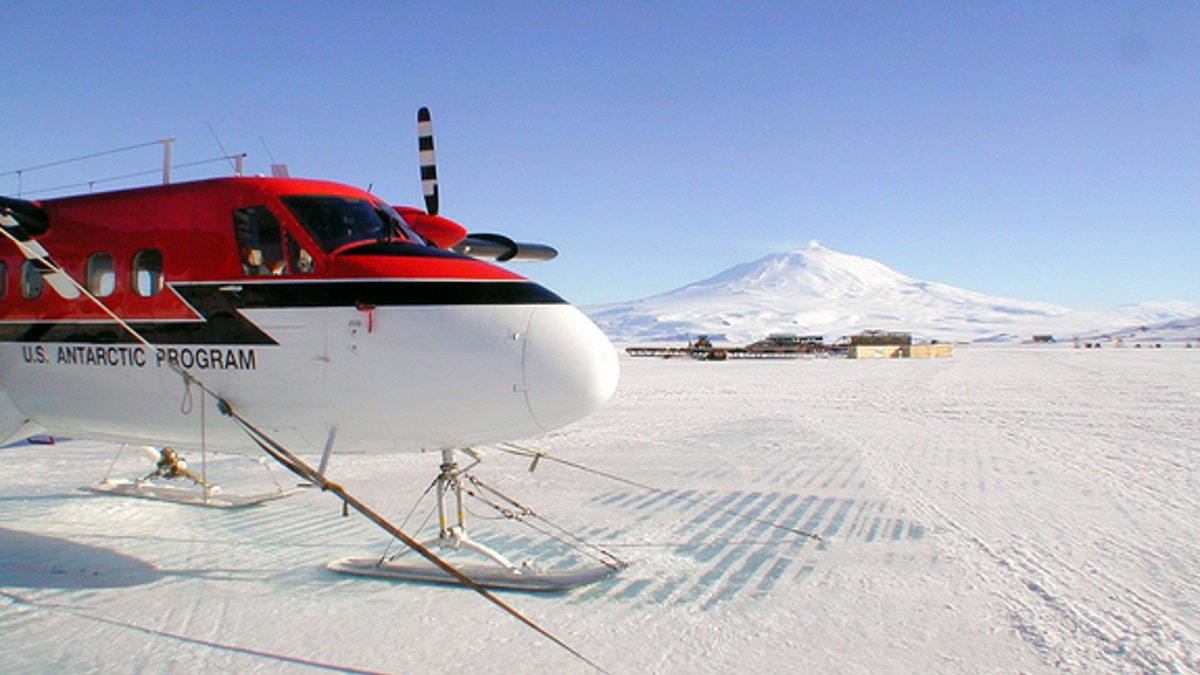
A U.S. Antarctic Program Twin Otter on the sea ice of McMurdo Sound. (Peter West/National Science Foundation)
As scientists had feared, the National Science Foundation announced it was canceling the U.S. Antarctic research program for this year because of the ongoing government shutdown.
Scientists and contractors already stationed at the three U.S. science bases on Antarctica will be sent home and a small staff left behind to maintain the structures and equipment, the National Science Foundation (NSF) said Tuesday.
[pullquote]
The announcement was a devastating blow for the polar science community. The shutdown means the cancellation of millions of dollars of planned research. Graduate students may have to stay in school longer because they won't get the data they need to complete their research. Contractors are losing their jobs. Other countries, including New Zealand, France and Italy, rely on the United States' sea-ice runway at McMurdo Station and may not be able to conduct their own research after the pullout. [Weirdest Effects of the Shutdown]
Though the NSF said it would work to restart science activities after the government shutdown ends, many U.S. scientists will miss their timing window for the summer research season, which started Oct. 3.
"It makes the blood boil," said Ross Powell, a geologist at Northern Illinois University and chief scientist for the WISSARD project, the first drilling expedition to discover life in a buried Antarctic lake.
This year, Powell and his colleagues planned to drill into the spot where the Whillans Ice Stream meets the sea. Remote sensing surveys suggests water flows from the buried Lake Whillans into the ocean underneath the Ross Ice Shelf, creating a hidden, estuary-like setting.
The NSF has invested $10 million in the project, not counting the hours and hours of planning and operational time, Powell said. "If we don't get this field season, basically, we've wasted half the money," Powell told LiveScience.
Dawn Sumner, a geobiologist at the University of California, Davis, expected to leave for Antarctica on Oct. 17. Now, Sumner said she's in a holding pattern, waiting to see if Congress "gets its act together" in time for her to salvage her research plans, she told LiveScience.
"Mine is somewhat time-sensitive; we can't do it in midsummer," Sumner said of her research on microbial life in Antarctic lakes, though she put her plight in perspective. "Although I am very disappointed in losing some, possibly all, of my research, the impacts on other people's health and safety are much more dire."
Other projects that could be affected by the pullout include NASA's Operation IceBridge, which tracks yearly changes in the polar ice, as well as the ongoing monitoring of climate change. Interrupting the unbroken data sets researchers gather to gauge global warming makes it difficult to analyze trends, many scientists have said.
Copyright 2013 LiveScience, a TechMediaNetwork company. All rights reserved. This material may not be published, broadcast, rewritten or redistributed.
